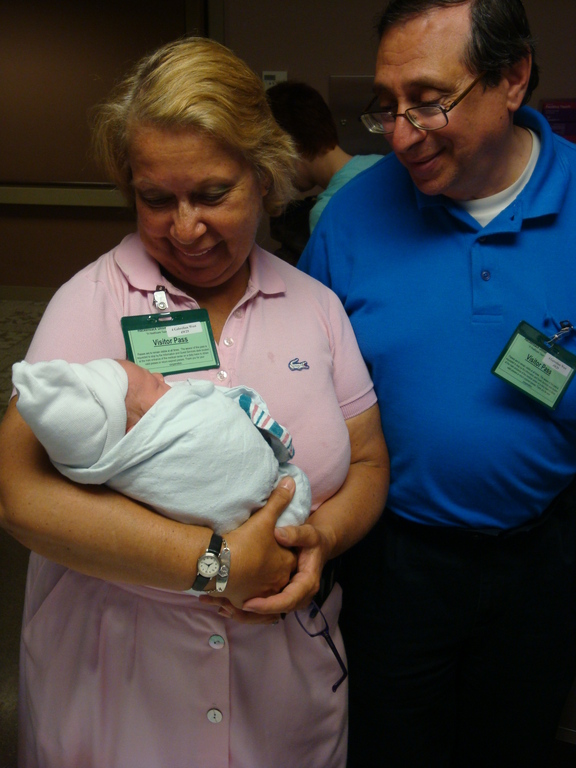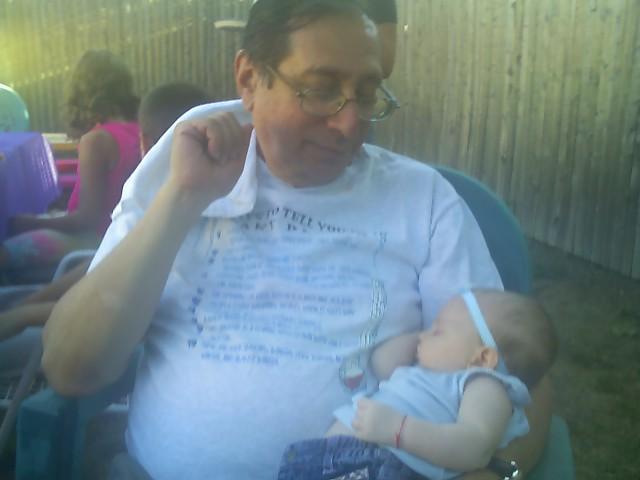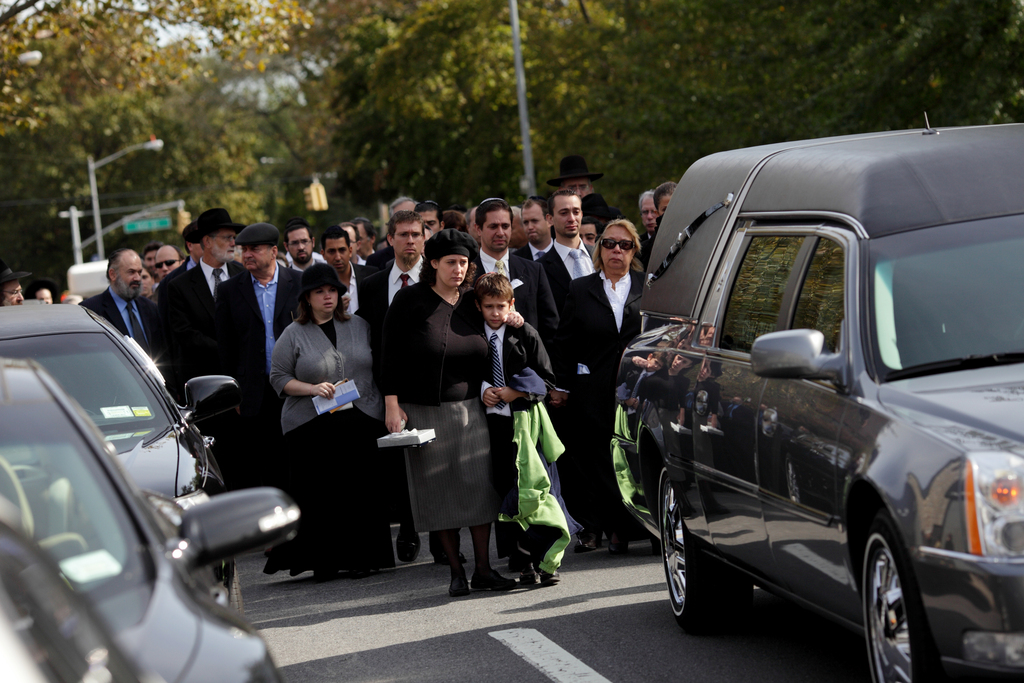Lost but not forgotten: Hundreds mourn Steven Mayer
By Michael Orbach
Issue of October 22, 2010/ 14 Cheshvan 5771Steven Mayer’s funeral began moments late. Among his many qualities, Mayer was described as a “yekke,” a noun used to describe a descendent of German Jews and their legendary attention to detail and punctuality. It was a badge Mayer wore with pride.
“Shul started when Steven Mayer said shul started,” reminisced Rabbi Dale Polakoff, of the Great Neck Synagogue, where Mayer served as president.
Mayer’s funeral on Oct. 18 was the end of a saga that gripped the regional Jewish communities. The 65-year-old father of four and grandfather of 10 went missing on Oct. 4, with his last calls placed in Riverhead. A feverish search ensued, with thousands scouring eastern Long Island. Last Saturday, a hunter came across Mayer’s body in Riverhead. The Nissan Sentra that he drove was wedged between two trees on a private road and his body was not far from it.
Mayer “was missing and is still missing from our lives,” Rabbi Polakoff said. Several hundred mourners packed Sinai Chapels in Queens and filled the main sanctuary. Pamphlets given out at the door requested that people not ask about the specifics of Mayer’s death. Instead, Rabbi Polakoff and family members spoke about who Mayer was: a yecke with an affinity for sports, a dedication to Judaism and a love for his family.
“You can take the boy out of Washington Heights, but you can’t take Washington Heights out of Steven Mayer…” Rabbi Polakoff said. “Every shul needs a Steven Mayer, someone to yell out to the rabbi when the page number is wrong in the Shabbos announcements.”
However, Rabbi Polakoff continued, Mayer also had a “component of tzedakah [generousness] to him.”
“He had both those elements, chesed, compassion, and caring for his family and others, and an expansive nature when it came to his grandchildren because they could do no wrong in his eyes,” Rabbi Polakoff said.
The family believes Mayer suffered a partial seizure the morning he disappeared. He had been on anti-seizure medicine and had suffered two seizures in the past, but was otherwise healthy. The day he disappeared, Susan, his widow, recalled he had been sitting in the kitchen eating breakfast, complaining about how his back hurt after he took down the sukkah. The family was optimistic about the chances of finding him alive.
Mark Klinger, the husband of Mayer’s daughter, Debbie, called the search for him, which involved Jews across the spectrum, a “Kiddush Hashem” [sanctification of G-d’s name].
During the funeral, Mayer’s eldest son, Jason, recalled his father as always being there for the children, “no matter how busy he was at work.”
If I am a good father, it’s because I’m following your playbook, Jason said.
Weeks ago, Jason had reminisced with his father about how he carried him on his back out of a community pool to the ice cream truck. The two always got a toasted almond Good Humor bar. Recently, Mayer bought his son a box of Good Humor chocolate eclair bars that have packaging similar to the toasted almonds bar.
“I didn’t have the heart tell him he had bought the wrong box,” Jason said.
Jason recalled the rules of stickball his father taught him, the most important being that if the ball made it onto a fire escape, you didn’t want to be the one who knocked on the front door.
According to his son, Mayer spent countless summer hours in Yankee Stadium, where a seat in the bleachers behind a pole was cheap. One time, Jason recalled, his father and a friend managed to sneak down to the lower seats, only to watch as one of Mickey Mantle’s 531 home runs sailed over their heads to land near their original seats.
Mayer’s greatest pride was in his grandchildren, several speakers said.
Aliza Mayer, his daughter-in-law, explained via email how she and her father-in-law would read the newspaper together while watching Aliza’s 3-month-old daughter “laughing and cooing on her activity mat.” Mayer kept on interrupting their reading to comment on his granddaughter’s progress.
“‘Look she’s 80 percent there! 85 percent!’” Aliza recalled him saying.
The last family member to speak was Scott Mayer, Mayer’s oldest grandchild. He spoke fast, reading a letter he wrote to his grandfather. He began the tradition of calling Mayer “poppa” since he couldn’t pronounce the word grandpa. Mayer and his wife, Scott said, would switch to German when they were arguing so the children couldn’t understand them.
“I will always remember you, Poppa,” Scott finished.
Rabbi Polakoff concluded the ceremony by telling those gathered to not feel guilty for being unable to locate Mayer.
“Hashem [G-d] didn’t want us to find Steven Mayer until the right time and when we looked it wasn’t the right time,” Rabbi Polakoff explained. Maybe, he stipulated, it was because Hashem “got so much nachas from seeing his children come together.”
“Sadly, we accept that judgment with many tears,” Rabbi Polakoff said.
Rabbi Polakoff concluded his speech by saying that he didn’t want people to have their last memory of Mayer being his tragic, chaotic demise. That would be unlike Mayer, he explained. Instead Rabbi Polakoff wanted the community to have an image of how Mayer lived.
Recently, Mayer and his wife had taken a safari in South Africa. Anyone who knew Mayer would understand that this was “not his cup of tea” and before he went he ensured that he could work out a minyan and be able to keep kosher on the trip.
Throughout the trip, there was only one hitch. On Friday night, a monkey made off with the only challah the group had. As the monkey ran through the dining hall, hot in pursuit, Rabbi Polakoff said, was Steven Mayer.
“There was no way, he was not going to have that challah for his Shabbos meal,” Rabbi Polakoff said.
Needless, to say, he got the challah back.
Rabbi Ian Licther, associate rabbi of the Great Neck Synagogue, read the prayer of Kel Maleh Rachamim [G-d full of mercy], and surrounded by friends and family, Mayer was carried to the waiting hearse.

 55.0°,
Mostly Cloudy
55.0°,
Mostly Cloudy 









